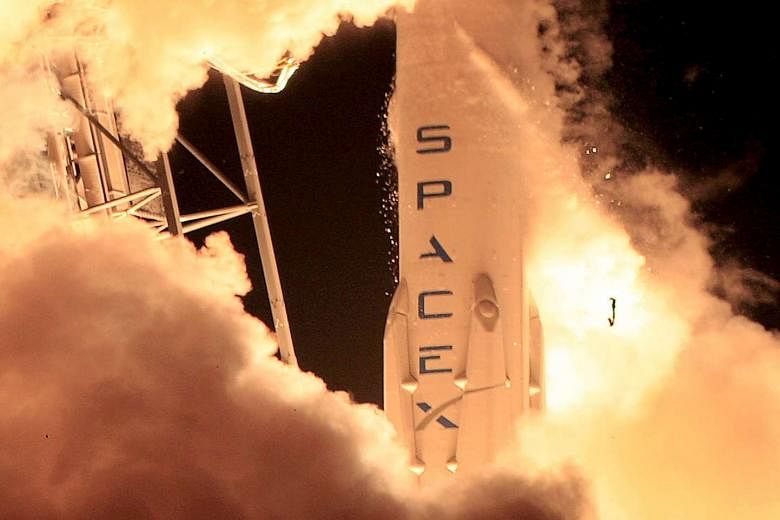CAPE CANAVERAL, Florida (REUTERS/AFP) - A SpaceX Falcon rocket thrust a communications satellite into orbit on Friday (March 5) before the reusable main-stage booster turned around, soared back toward Earth and was destroyed when it failed to land itself on a platform in the ocean, the company said.
The satellite successfully reached its geostationary orbit more than 40,000km above the Earth, about 100 times as high as the International Space Station. From there it will deliver broadband and television channels to South-east Asia.
"Target altitude of 40,600 kilometers achieved," wrote SpaceX chief executive Elon Musk on Twitter. "Thanks @SES-Satellites for riding on Falcon 9! Look forward to future missions."
After the launch, SpaceX tried to land the first stage of its rocket on a platform floating in the Atlantic Ocean about 600km off the east coast of Florida.
The droneship, as it is called, is marked with a large "X" and the words, "Of Course I Still Love You".
Grainy video footage showed a bright light approaching the droneship from the upper left, before the live feed cut out.
"Rocket landed hard on the droneship. Didn't expect this one to work," Mr Musk wrote on Twitter. "But next flight has a good chance."
SpaceX, owned and operated by Mr Musk, previously said the chances of a successful return landing of the rocket's main stage at sea were slim, given its high speed when it separated from the spacecraft.
A returning Falcon rocket main stage successfully touched down on a ground-based landing pad near the launch site in December following a less-demanding launch.
The rocket, carrying the 5,721kg Boeing-built satellite, lifted off from Cape Canaveral Air Force Station at 6/35 pm Eastern Standard Time. The launch, which had been delayed four times since Feb 24, marked the second of more than 12 SpaceX flights expected this year.
The Beoing-built satellite is owned by Luxembourg-based communications network operator SES SA.
SpaceX was aiming to deliver the satellite as high as 39,000km above Earth and still have enough fuel to land the first stage of the Falcon rocket on a platform floating about 645km off Florida's coast.
In December, a returning Falcon 9 rocket successfully touched down on a ground-based landing pad in Florida, an unprecedented milestone in Musk's quest to develop a cheap, reusable booster.
The rocket flying on Friday was traveling too fast to return to land, prompting SpaceX to try the ocean landing, though the company sought to lower expectations.
"Given this mission's unique... profile, a successful landing is not expected," SpaceX said in a statement before the launch.

